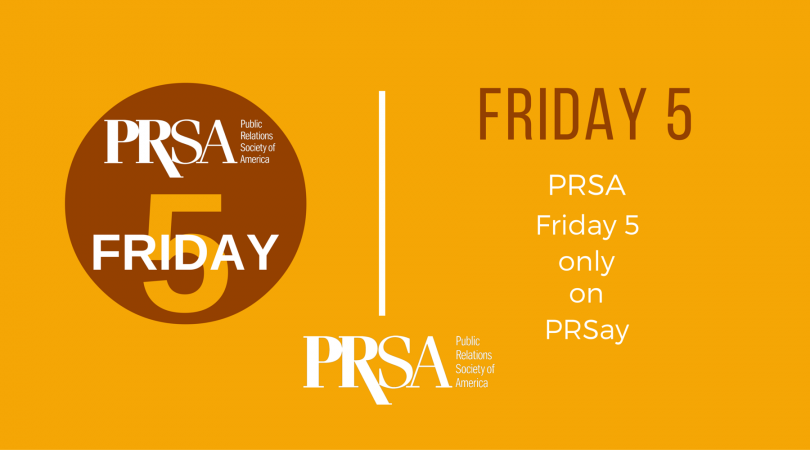Managing a Facebook account for a brand shouldn’t take an advanced degree, but it seems like lately you need an owner’s manual to run a page properly. Even if you attempt to stay ahead of changes and best practices, the platform evolves so quickly that it can become difficult to keep up. In fact, over the past couple years, brands have been discussing shutting down their Facebook pages altogether because their posts weren’t being seen by followers.
In this week’s Friday Five – PRSA’s take on the week’s biggest news stories – we’ll discuss Facebook’s latest news feed change and share four other lessons for PR professionals.
Here’s what we learned this week:
1) Facebook Gives Control Back to Its Users
Is Facebook giving you the news you want to see? I often feel as if I am seeing the same irrelevant posts over and over again, but missing posts I’m actually interested in. As Facebook continually changes its algorithm, it often claims that users don’t want to see posts from brands and businesses. Nonetheless, users like me have said that if I didn’t want to see a post from a page, I wouldn’t have “liked” the page to begin with.
Now, it seems that Facebook is listening. According to The New York Times, “Facebook announced a set of features that will give each person more control over what he or she wants to see. In essence, you get to reprogram the algorithm.” For PR professionals, this can mean a new opportunity to connect with Facebook followers. As Vindu Goel of the Times explains, “Businesses on Facebook, which complain that very few of their fans actually see their posts in the news feed, will also get the chance to persuade those fans to add them to the ‘see first’ list so they don’t miss a thing.”
2) When a Spokesperson is in Hot Water, so is a Brand
When a spokesperson perfectly aligns with your brand’s image, it can seem like a win-win situation for your company. It’s easy to forget, however, that spokespeople are connected to your company through good times and bad. When Jared Fogle lost 325 pounds while eating Subway and exercising and became a spokesperson for the brand 15 years ago, I highly doubt anyone in the corporate offices could foresee that they would one day be tied to a child pornography investigation.
On paper, it appears that Subway is handling this crisis well. The brand suspended their relationship with Fogle and issued a statement and an announcement via Twitter. Only time will tell, however, if Subway’s relationship with Fogle will hurt their reputation in the long run.
3) A Halt in Communication Can Lead to Panic
In a post 9/11 world, it can be alarming to hear that trading is suspended at the New York Stock Exchange (NYSE) without further information. On Wednesday, that’s exactly what happened, and former New York City Mayor Rudolph Giuliani called the NYSE’s response “atrocious.”
PRWeek’s Laura Nichols reported on Giuliani’s response. While the reports said that the incident wasn’t because of a data breach, it was clear that the NYSE wasn’t being forthright with information. Giuliani suggested it would have been best to get ahead of the situation and clearly act to communicate to the public to avoid public panic.
4) Getting a Check Mark is Harder than You Think
Even the most savvy social media users have had it happen to them—while scrolling through Facebook or Twitter you’re fooled by a bogus, spam-filled account intentionally created to mislead the public. To cut down on these incidents, Twitter and Facebook have enabled a small blue check mark to tell users that the accounts are legitimate, and therefore verified, by the social media site.
Ever since these blue marks of approval have been showing up on various accounts, brands have been clamoring to get their own. According to PRNewser’s Patrick Coffee, however, there is little rhyme or reason to why certain accounts get verified and others do not. If you’re looking for verification, we wish you good luck with this seemingly random process.
5) Giving Toys that Swear to Children is Probably Not Good for Your Brand’s Reputation
Not only do you need to worry about the fat and calories your kids are ingesting while eating a McDonald’s Happy Meal, but you apparently also have to worry about them picking up profanity from the toys that come along with their meals. At least that’s what a few families are claiming by posting YouTube videos of their talking Minion toys.
According to Mashable, McDonald’s claims that the toy says “para la bukay,” “hahaha” and “eh eh” and that the Minions speak their own languages that cannot be translated to English. Do you have a crisis communication plan for swearing toys? This situation shines a whole new light on worst case scenario planning. What is the most ridiculous situation that has come up for a brand you’ve worked on? Share in the comments section below.







